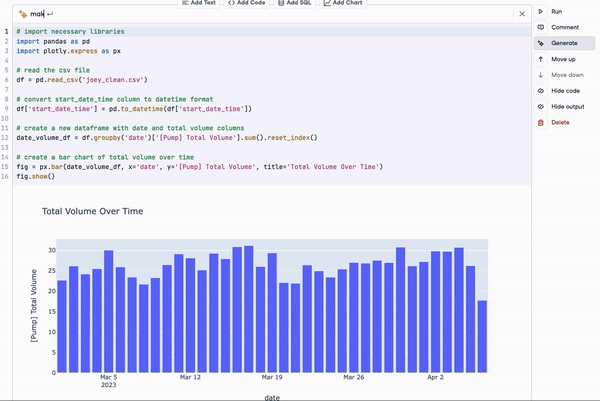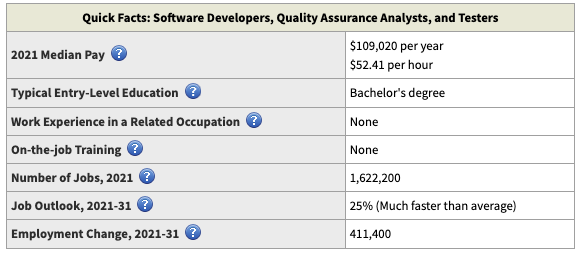Track
The massive adoption of ChatGPT and other generative AI tools is rapidly reshaping our society. The current AI boom will affect nearly every sector of the economy, with implications that are still difficult to foresee.
The fields of software development and data science are no exception. Indeed, following the advent of ChatGPT, GitHub Copilot, and other AI-powered tools, the industry is sparking speculation about the future of coding.
Will AI replace programming? We cannot read the future, but the short and most likely answer is that it won’t, at least in the near future.
However, as developers and data professionals incorporate these AI tools into their toolboxes, their role as programmers may well change forever, as will the nature of their tasks. As such, having a degree of AI literacy will become essential going forward.
Keep reading to learn about how AI will reshape the future of data science and software development.
The Growing Influence of AI on Programming
Next-generation AI tools already offer many opportunities in software development and data analysis. The number of use cases is rapidly growing as new AI-powered tools reach the market and developers become familiar with them. Here is a list of some of the ways programmers are already using AI:
Task automation
AI tools can seamlessly automate repetitive and mundane tasks, such as performing basic SQL queries, performing data exploratory analysis, and streamlining data science projects (as seen in this illustrative guide to using ChatGPT for data science). This can help programmers skip time-consuming tasks and focus on more complex and challenging work.
Bug fixing
Debugging often takes considerable time and can be challenging, especially if working on complex projects with hundreds of lines of code. AI is the perfect ally to speed up this process by scanning your code in seconds and providing code and structure suggestions to fix it. Tools like GitHub Copilot are particularly useful for this process.
Project delivery estimation
Setting realistic estimations of the time, costs, and resources required for a new project is vital to enhance productivity and ensure success. AI models can support project delivery estimation by taking into account several factors, such as project complexity, resource availability, and seniority of the development team. A range of such AI project management tools exist.
Code optimization
When working on complex projects that require large amounts of computational resources, efficiency is a must. The way code is written can severely affect efficiency. AI tools can help rewrite your code in order to improve efficiency, thereby saving you time, resources, and money. You can use tools like ChatGPT’s Code Interpreter to write and execute your code to help you find optimal solutions.
Code translation
Developers sometimes have to work with several programming languages, whether for interoperability purposes, or to port codebases written in an obsolete or deprecated language. Translation processes are often time-consuming and require expertise in both the source and target languages, making code-translation projects expensive. Fortunately, innovative AI techniques and tools such as CodeMorph are making this task easier and more cost-effective.
Code interpretability
Sometimes, understanding others’ code can be hard, especially for junior coders. Cutting-edge AI tools not only can suggest code improvements but also provide detailed explanations on a certain piece of code, thereby helping you learn faster. For example, this is one of the features of the DataLab AI assistant, as explained in a separate article.

DataCamp’s AI Assistant at work
The Limitations of AI in Programming
Despite the ground-breaking results of generative AI tools, the technology is not yet mature enough to replace programmers. In other words, while generative AI like ChatGPT can be used for a wide range of downstream tasks, bringing us closer to the idea of Artificial General Intelligence (a hypothetical level of AI which can accomplish any intellectual task that human beings or animals can perform), it is still unable to think or behave like humans.
State-of-the-art AI still lacks the human creativity, intuition, and domain expertise that is very much required in programming. While AI can help in many coding tasks and even boost creativity, it’s for humans to conceptualize complex systems, understand business problems, and make strategic decisions.
Also, despite its impressive results, there are several risks and challenges associated with AI that make human oversight mandatory, especially when AI-supported decisions can have significant implications for individuals and society.
Our Generative AI Concepts Course is a great resource for knowing more about the risks and ethical considerations of the adoption of AI, and our article about the ethics of generative AI covers some of those concerns.
Finally, AI systems are trained on historical data, meaning that they may not always keep up with the latest developments in the fast-paced domains of software development and data science. Hence, while AI can succeed in mastering consolidated knowledge, it’s for humans to expand the boundaries of knowledge, developing new tools, techniques and paradigms.
The Future of Programming: Collaboration Between AI and Programmers
Rather than AI replacing developers, it will likely reshape their role. Collaboration is the most likely scenario for the coming future.
Equipped with next-generation AI tools, developers will be relieved from mundane, time-consuming routines. This shift will allow them to focus on more innovative and challenging tasks.
Overall, adopting AI will speed up software and data development processes, increasing productivity and efficiency.
The “augmented” development movement that AI will bring about has the potential to simplify programming and make it more accessible, as a wide range of programming tasks can be by now performed with plain human language in a matter of seconds.
This augmentation may translate into a reduction of entry-level programming jobs, for many of the tasks traditionally done by junior coders will be automated or simplified by generative AI tools like ChatGPT or GitHub Copilot.
But AI tools are far from perfect and bulletproof. Human oversight is essential to ensure that they only deliver positive outcomes. This will open up new opportunities for developers, whose responsibilities will partly shift towards overseeing and managing AI systems. In this sense, developers and data scientists with machine learning and AI ethics skills will likely be in high demand.

Wil AI replace programmers? The US Bureau of Labor Statistics predicts significant growth in this area
Final Thoughts
So will AI replace programmers? Overall, the current AI boom has the potential to revolutionize the tech industry rather than make professionals obsolete. The tech may well fundamentally change the job market for those in programming, software, and data career paths.
This is not new for an industry that has a disruption in its DNA. Over the last decades, developers and data professionals have confronted multiple technological breakthroughs, paradigm shifts, and crises –the COVID-19 pandemic being the latest.
Not only have they survived all of them, the industry has always thrived during creative destruction processes, resulting in new roles and specializations. With software and data professionals in high demand and no sign of decline in the coming future, the industry is ready to surf the AI revolution.
Rather than a threat, AI will provide new tools that will be the new normal in the programmer toolkit of the coming years. The change is already on the way. For example, according to the Stack Overflow Developer Survey 2023, 70% of all respondents are using or are planning to use AI tools in their development process this year.
Similarly, The U.S. Bureau of Labor Statistics forecasts a growth of 25% in employment for software developers over the coming years, much higher than the average across all occupations.
So, whether you’re a newcomer to the industry or an experienced programmer, embracing AI is a wise and timely choice to enhance your career prospects in the data industry.
Willing to get started in AI tools? DataCamp has you covered. Check out our AI-focused materials and start learning today!
- What is AI?
- How to Learn AI guide
- Artificial Intelligence (AI) Concepts in Python Course
- ChatGPT Cheat Sheet for Data Science
- How to Use ChatGPT Code Interpreter Tutorial
- A Guide to Using ChatGPT For Data Science Projects
- Understanding Artificial Intelligence Course
- Generative AI Concepts Course
- AI Essentials Skill Track

I am a freelance data analyst, collaborating with companies and organisations worldwide in data science projects. I am also a data science instructor with 2+ experience. I regularly write data-science-related articles in English and Spanish, some of which have been published on established websites such as DataCamp, Towards Data Science and Analytics Vidhya As a data scientist with a background in political science and law, my goal is to work at the interplay of public policy, law and technology, leveraging the power of ideas to advance innovative solutions and narratives that can help us address urgent challenges, namely the climate crisis. I consider myself a self-taught person, a constant learner, and a firm supporter of multidisciplinary. It is never too late to learn new things.
